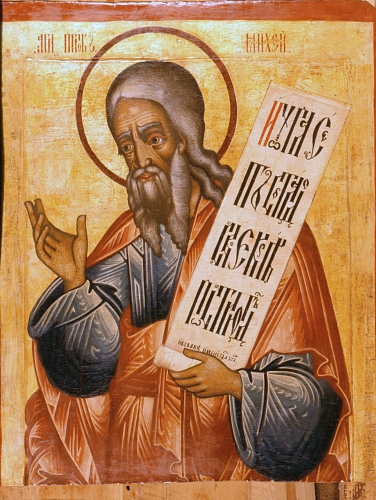
Micah (prophet)
According to the Hebrew Bible, Micah (Hebrew: מִיכָה הַמֹּרַשְׁתִּי Mīḵā hamMōraštī "Micah the Morashtite"), also known as Micheas,[1] was a prophet in Judaism and is the author of the Book of Micah. He is considered one of the Twelve Minor Prophets of the Hebrew Bible and was a contemporary of the prophets Isaiah, Amos and Hosea. Micah was from Moresheth-Gath, in southwest Judah. He prophesied during the reigns of kings Jotham, Ahaz, and Hezekiah of Judah.
Not to be confused with Micaiah or Micah's Idol.
Micah the Prophet
July 31 Roman Catholic January 5 and August 14 Eastern Orthodox
Micah's messages were directed chiefly toward Jerusalem. He prophesied the future destruction of Jerusalem and Samaria, the destruction and then future restoration of the Judean state, and he rebuked the people of Judah for dishonesty and idolatry.
Micah 5:2 is interpreted by Christians as a prophecy that Bethlehem, a small village just south of Jerusalem, would be the birthplace of the Messiah.
Biblical narrative[edit]
Micah was active in Judah from before the fall of Israel in 722 BC and experienced the devastation brought by Sennacherib's invasion of Judah in 701 BC. He prophesied from approximately 737 to 696 BC. Micah was from Moresheth, also called Moresheth-Gath, a small town in southwest Judah. Micah lived in a rural area, and often rebuked the corruption of city life in Israel and Judah.[2] The subject's father is not given and likely descended from the common people as the target of his message was towards the privileged classes.[3]
Micah prophesied during the reigns of kings Jotham, Ahaz, and Hezekiah of Judah.[4] Jotham, the son of Uzziah, was king of Judah from 742 to 735 BC, and was succeeded by his own son Ahaz, who reigned over Judah from 735 to 715 BC. Ahaz's son Hezekiah ruled from 715 to 696 BC.[5] Micah was a contemporary of the prophets Isaiah, Amos, and Hosea. Jeremiah, who prophesied about thirty years after Micah, recognized Micah as a prophet from Moresheth who prophesied during the reign of Hezekiah.[6]
Liturgical commemoration[edit]
Micah is commemorated with the other eleven minor prophets in the Calendar of Saints (Armenian Apostolic Church) on July 31. In the Eastern Orthodox Church he is commemorated twice in the year. The first feast day is January 5 (for those churches which follow the traditional Julian Calendar, January 5 currently falls on January 18 of the modern Gregorian Calendar). However, since January 5 is also the eve of the Great Feast of Theophany (in the west, Epiphany) and a strict fast day (near total abstinence from food and non-religious activities), his major celebration is on August 14 (the forefeast of the Great Feast of the Dormition of the Mother of God).[20]